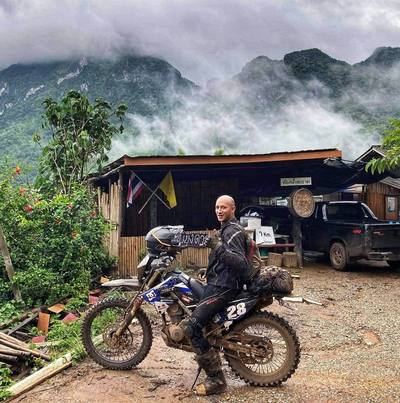If you are involved in a motorcycle accident, it is important to take the necessary steps to protect yourself and ensure your safety.
Many people make common mistakes following an accident, which can lead to further injury or legal trouble. In this blog post, we will discuss the steps that you should take immediately after a motorcycle accident.
Remain Calm and Assess the Situation
For starters, it is important to remain calm after an accident. Easier said than done, but it is important to try and keep a level head. After you have calmed yourself down, take a look around and assess the situation.
This will help you determine what needs to be done next. Also, try and take note of anything that may be important later on, such as the location, time, weather, etc.
If You Are Able To, Move Your Motorcycle To the Side of the Road
To make sure that you and your motorcycle are not in danger, it is important to move your motorcycle off of the road if possible. If you cannot move your motorcycle, make sure to turn on your hazard lights so that other drivers are aware of the situation.
Also, when it comes to your motorcycle, it is important to take a few moments to assess the damage. This will give you a better understanding of what needs to be done in order to get your motorcycle repaired.

Turn on Your Hazard Lights
Since you’re more likely to be hit from the rear after a motorcycle accident, it’s important to warn drivers behind you that something has happened.
Turning on your hazard lights will help make other drivers aware of the situation and hopefully prevent them from running into you.
Also, hazard lights can act as a signal to first responders that someone needs help, so they can find you more easily.
Get Off the Motorcycle and Check For Injuries
If you are able, gently move off of the motorcycle to the side of the road. It is important to check for injuries at this point and to not make any sudden movements, as you could exacerbate any potential injuries. Once you have assessed that you are okay, or have received help in moving if necessary, check on your passengers or anyone else involved in the accident.
Now, it can seem like you have no injuries at all after an accident, but it is still important to get checked out by a medical professional as soon as possible. You may have adrenaline coursing through your body masking any pain, or you could have injuries that will not present themselves until hours or days later. A concussion, for example, may not show symptoms until later on. It is always better to err on the side of caution and get a professional opinion.
Call 911 if Anyone is Injured
In many states, it is required by law to report any accident resulting in injury, death, or property damage exceeding a certain dollar amount. Even if the accident seems minor, it’s always best to err on the side of caution and call for medical help if anyone is injured. The faster emergency services can arrive on the scene, the better the chance of a positive outcome.

Contact a Lawyer
Once you have received medical attention, your next step should be to contact a lawyer who specializes in motorcycle accidents.
A lawyer can help you understand your legal rights and options, as well as help you receive the compensation you deserve.
And luckily, you can always contact a lawyer immediately. And, for instance, if you live in Texas, you can easily find a motorcycle accident lawyer practicing in Austin, or any other city in Texas. Just make sure you do your research to find a reputable lawyer who will have your best interests at heart.
Exchange Information With the Other Driver Involved in the Accident
One of the first things you should do after a motorcycle accident is exchange information with the other driver involved. You will need their name, address, phone number, and insurance information. It is also a good idea to take pictures of their license plate and insurance card in case they decide to leave the scene of the accident.
If there are any witnesses to the accident, you should also get their contact information in case you need to speak with them later on.

Once you have all of this information, you should call your insurance company and file a claim. They will likely ask for all of the same information that you collected from the other driver involved.
Contact Your Insurance Company
Of course, you will want to contact your insurance company as soon as possible. You will likely have to give a recorded statement, so it is important that you do not say anything that could be used against you later on. Be sure to get the other driver’s insurance information as well. If the other driver was at fault, their insurance should cover any damages. If the other driver was not at fault, your insurance should still cover you, but you may have to pay a deductible.
Do Not Admit Fault or Apologize for the Accident
Even if you think you might be at fault for the accident, do not say so to anyone at the scene. It is important to wait until you have had a chance to speak with an attorney before admitting any sort of responsibility. An apology could also be used against you in court as an admission of guilt.
Additionally, do not sign anything or give a recorded statement to an insurance company until you have consulted with an attorney. Anything you say could be used against you later on.
In the end, it is important to know what steps to take immediately following a motorcycle accident. By remaining calm, getting medical attention, and gathering evidence, you can help ensure that your case is handled in the best way possible. If you have been injured in a motorcycle accident, contact an experienced personal injury attorney today.
ABOUT THE AUTHOR
Fred Felton
Content Creator / Editor
Fred Felton is a copywriter, editor and social media specialist based in Durban, South Africa. He has over 20 years of experience in creating high end content. He has worked with some of the biggest brands in the world. Currently Fred specialises in the motorbiking adventure space, focussing on all types of biking both on and offroad. He is also a keynote speaker and has presented talks and workshops in South Africa.






